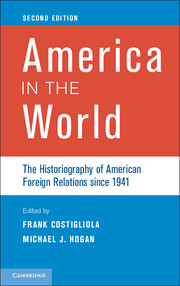Book contents
- Frontmatter
- Dedication
- Contents
- List of Contributors
- Preface
- 1 Introduction
- 2 The Charlie Maier Scare and the Historiography of American Foreign Relations, 1959–1980
- 3 Chaps Having Flaps: The Historiography of U.S. Foreign Relations, 1980–1995
- 4 Still Contested and Colonized Ground: Post–Cold War Interpretations of U.S. Foreign Relations during World War II
- 5 Recent Literature on Truman’s Atomic Bomb Decision
- 6 The Cold War
- 7 Cold War Presidents: Dwight D. Eisenhower, John F. Kennedy, Lyndon Baines Johnson, and Richard M. Nixon
- 8 The War that Never Ends: Historians and the Vietnam War
- 9 Culture and the Cold War: U.S.–Latin American Historiography since 1995
- 10 Impatient Crusaders: The Making of America’s Informal Empire in the Middle East
- 11 Explaining the Rise to Global Power
- 12 Bringing the Non-State Back In
- 13 Technology and the Environment in the Global Economy
- 14 U.S. Mass Consumerism in Transnational Perspective
- 15 A Worldly Tale
- Index
- References
12 - Bringing the Non-State Back In
Human Rights and Terrorism since 1945
Published online by Cambridge University Press: 05 June 2014
- Frontmatter
- Dedication
- Contents
- List of Contributors
- Preface
- 1 Introduction
- 2 The Charlie Maier Scare and the Historiography of American Foreign Relations, 1959–1980
- 3 Chaps Having Flaps: The Historiography of U.S. Foreign Relations, 1980–1995
- 4 Still Contested and Colonized Ground: Post–Cold War Interpretations of U.S. Foreign Relations during World War II
- 5 Recent Literature on Truman’s Atomic Bomb Decision
- 6 The Cold War
- 7 Cold War Presidents: Dwight D. Eisenhower, John F. Kennedy, Lyndon Baines Johnson, and Richard M. Nixon
- 8 The War that Never Ends: Historians and the Vietnam War
- 9 Culture and the Cold War: U.S.–Latin American Historiography since 1995
- 10 Impatient Crusaders: The Making of America’s Informal Empire in the Middle East
- 11 Explaining the Rise to Global Power
- 12 Bringing the Non-State Back In
- 13 Technology and the Environment in the Global Economy
- 14 U.S. Mass Consumerism in Transnational Perspective
- 15 A Worldly Tale
- Index
- References
Summary
On March 17, 2011 the United Nations Security Council passed resolution 1973, imposing a no-fly zone over Libya and authorizing member states to take measures to protect Libyan civilians from the government of Muammar Gaddafi, which was using repressive measures to crush a popular uprising against his decades-long rule. Subsequently, NATO warplanes began bombing Libya, which U.S. president Barack Obama justified in the name of human rights, specifically the so-called “responsibility to protect” doctrine, developed by the UN and other international bodies in the wake of their failure to respond to genocidal violence in Europe and Africa in the 1990s. The U.S.-led campaign came twenty-five years after President Ronald Reagan, in April 1986, ordered similar air strikes against Libya following the bombing of a Berlin nightclub which was blamed on Libyan intelligence agents. Reagan justified U.S. actions then in the name of counterterrorism, stating that Gaddafi had made Libya “a synonym for barbarism around the world.” After the attacks of September 11, 2001, Gaddafi switched hats, cooperating with U.S. and European-led counterterrorism efforts against al-Qaeda, until the so-called “Arab Spring” of 2011 caused many Western governments to pivot against him.
- Type
- Chapter
- Information
- America in the WorldThe Historiography of American Foreign Relations since 1941, pp. 260 - 283Publisher: Cambridge University PressPrint publication year: 2013
References
- 1
- Cited by

